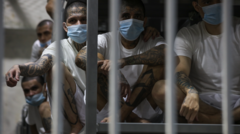El Salvador's President Nayib Bukele has made a bold proposal to Venezuelan President Nicolás Maduro, offering to repatriate 252 Venezuelans recently deported by the U.S. in exchange for the release of an equal number of Venezuelan political prisoners. Bukele took to social media to extend this humanitarian agreement, highlighting the contrasting fates of the deportees—many of whom face serious criminal allegations—and the political prisoners, whom he claims are incarcerated solely for opposing the Maduro regime.
In his message, Bukele noted that while some of the Venezuelan deportees are accused of "rape and murder," the political prisoners in Venezuela have been jailed for dissent, a claim that human rights organizations support. Maduro's government rejects the notion that any political prisoners exist, maintaining that all detained individuals have violated laws.
Additionally, Bukele mentioned the situation of nearly 50 prisoners from other nations, including U.S. citizens, surrounding this proposed exchange. Despite Bukele's outreach, the Venezuelan government has yet to respond to his offer.
Recent reports indicate that El Salvador has seen the arrival of over 200 Venezuelans from the U.S., deported under accusations of being affiliated with the Tren de Aragua gang. The deportation initiative has been facilitated by financial support from the U.S. to house these individuals in El Salvador's notorious Terrorism Confinement Center.
As part of a wider immigration crackdown under former President Donald Trump, these actions have faced legal scrutiny recently, with the U.S. Supreme Court having paused further deportations of Venezuelan nationals, describing the legal challenges against such measures as "meritless litigation." The uncertainty over the use of the 1798 Alien Enemies Act, used in this context for the first time in decades, has raised concerns about human rights and executive power over deportees.



















